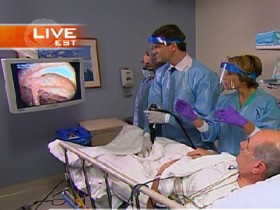Is morning colonoscopy better?
Studies have found that colonoscopies done in the afternoon are less likely to catch abnormal growths than those done in the morning. Now new research shows that the gap disappears when doctors work a half-day rather than a full one.
The findings, reported in the American Journal of Gastroenterology, support the idea that doctor fatigue helps explain why afternoon colonoscopies tend to catch fewer polyps.
Polyps are growths in the colon that are usually harmless but can sometimes become cancerous.
But that does not necessarily mean you need to worry if your colonoscopy is scheduled for the afternoon. Other factors - like carefully following the instructions for preparing for the colonoscopy - are more important, experts say.
For the new study, researchers at the Mayo Clinic Arizona in Scottsdale reviewed records for nearly 4,700 colonoscopies performed at their center in 2009.
Two-thirds were done by a doctor working a half-day, while doctors on a full-day schedule handled the rest.
When doctors worked a full day, the study found, polyps were detected in 26 percent of procedures done in the morning, but only 21 percent of those done in the afternoon.
That difference did not exist among doctors on half-day schedules. Polyps were found in about 27 percent of procedures done in the morning or afternoon.
 During a colonoscopy, the doctor threads a thin camera-equipped scope into the rectum and along the colon, looking for polyps and usually removing any that are found. Each exam takes about 30 minutes.
During a colonoscopy, the doctor threads a thin camera-equipped scope into the rectum and along the colon, looking for polyps and usually removing any that are found. Each exam takes about 30 minutes.
Researchers have speculated that when doctors repeatedly perform the exam all day, fatigue sets in - and that could explain the lower polyp detection rates that some studies have found later in the day.
The current findings support that notion, according to lead author Dr. Suryakanth R. Gurudu and his colleagues.
But, they write, “the exact mechanism leading to our study finding needs further evaluation.”
Dr. C. Prakash Gyawali, a gastroenterologist and researcher not involved in the study, agreed that fatigue could be a factor.
“This is indirect evidence that the repetitiveness of the procedure leads to less attentiveness for detecting polyps later in the endoscopist’s day,” Gyawali, of Washington University School of Medicine in St. Louis, told Reuters Health in an email.
In their own recent study, Gyawali and his colleagues looked at the results of nearly 1,100 colonoscopies. They found that for each hour that passed over the course of a day, there was a 4 percent decline in the number of polyps doctors found.
There are other possible reasons for lower afternoon detection rates, however.
One, Gyawali said, could be the colonoscopy preparation. Before having a colonoscopy, a patient has to thoroughly cleanse the bowels, usually by drinking a strong liquid laxative.
People often do that the night before the colonoscopy. But, Gyawali said, some experts recommend splitting the dose, taking half the morning of the procedure - which may be better for colonoscopies done in the afternoon.
And some research has suggested that taking the full dose on the same morning might be a better “bowel prep” for people having an afternoon colonoscopy.
So while doctor fatigue could be a factor later in the day, Gyawali said that colonoscopy patients should not be overly concerned about the timing of their procedure.
Instead, he said, “the quality of the bowel preparation is paramount in polyp detection, and the general public need to realize that following bowel preparation instructions is the single most important factor that will determine if all polyps have been found.”
Gyawali also said that many doctors may know what their own polyp detection rate is, and patients can ask for that information.
A rate somewhere between 25 percent and 40 percent would suggest that the doctor uses “good technique,” according to Gyawali. A rate below 20 percent, on the other hand, should give patients pause.
“My suggestion,” Gyawali said, “is that the general public pay attention to who they schedule their colonoscopy with, and try to schedule their procedure with a good doctor with an acceptable polyp detection rate.”
SOURCE: American Journal of Gastroenterology, online April 19, 2011.